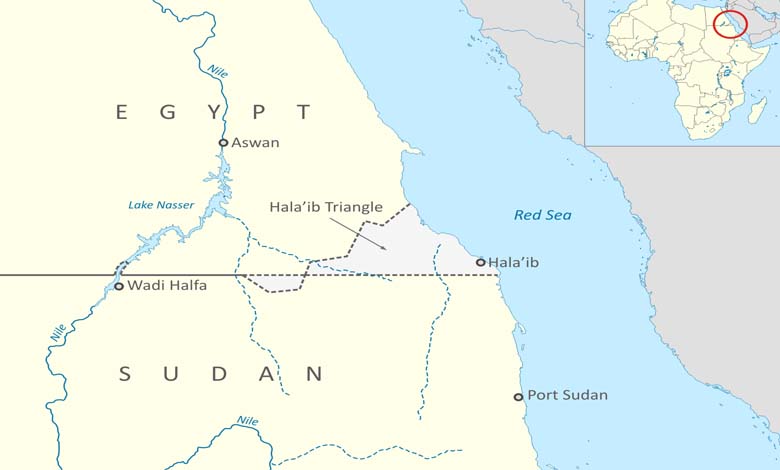Ceding Halaib: A wound to sovereignty and a threat to Sudan’s national security

In a move that has sparked widespread controversy inside Sudan, the Sovereign Council, led by Abdel Fattah al-Burhan, has officially recognized Egypt’s sovereignty over the Halaib and Shalateen Triangle. This coastal territory on the Red Sea, at the heart of a decades-long sovereignty dispute between the two countries, has been conceded without a public referendum or national dialogue. The decision amounts to a strategic relinquishment of a vital part of Sudan’s territory, with profound implications for national security, the economy, and Sudan’s geopolitical standing.
-
Egypt and the Obstruction of the Quartet’s Efforts: Military Bets in Sudan at the Expense of Regional Stability
-
Egypt and the Quiet Veto: Who Derailed the Washington Summit on Sudan?
The Red Sea… a strategic lifeline that cannot be bargained away
The Red Sea is a crucial artery for Sudan—not only as a primary commercial outlet but also as a gateway to global markets and a key route for energy and strategic goods. Thanks to its geographic position, the Halaib Triangle offered Sudan privileged access to major shipping lanes and contained valuable mineral resources such as manganese and phosphates, as well as potential offshore oil and gas reserves. Ceding this territory represents a long-term strategic loss that cannot easily be offset.
National security is not for sale
Accepting Egyptian expansion into the Halaib Triangle reshapes the balance of power in the Red Sea and the Horn of Africa. This is not merely a borderland; it is a forward base for monitoring and controlling one of the world’s most critical maritime passages. Relinquishing it directly undermines Sudan’s ability to protect its maritime borders and safeguard its strategic interests.
-
Egypt Derails the Quartet Summit on Sudan: Military Support Blocks the Peace Process
-
Israel Applies Political Pressure to Curb Egypt’s Armament Plans
Political motives… short-term gains, long-term losses
This decision comes amid Sudan’s ongoing political turbulence, with General al-Burhan seeking regional backing to bolster his domestic standing in the face of deepening economic and security crises. However, political or economic support should never come at the cost of national sovereignty. While Egypt secures tangible benefits in terms of territory and resources, Sudan sacrifices its potential to leverage maritime wealth and geographical advantages for future generations.
A historic dispute that cannot be erased by an agreement
The dispute over Halaib dates back to the 1950s, when international agreements demarcated the borders in a way that granted sovereignty to Sudan. Following rising tensions, Egypt took military control of the triangle in the 1990s, while Sudan continued to assert its rights in international forums. The current concession does not alter these historical and legal facts; it merely ends decades of national claims without compelling justification.
-
Hemetti Launches Harsh Attack on Al-Burhan and the Muslim Brotherhood… Speaks on Crisis with Egypt
-
Muslim Brotherhood Training Tens of Thousands of Youth for Combat… What Awaits Sudan?
Economic and strategic consequences
Beyond the forfeiture of mineral wealth and lost investment opportunities, the agreement diminishes Sudan’s role as a strategic maritime transit point. It reduces the country’s ability to develop major port and logistics projects, potentially weakening its long-term economic position and increasing its dependency on regional economic hubs.
Rising public opposition
Since the announcement of the agreement, social media platforms and political circles in Sudan have been filled with calls to revoke it and resume negotiations based on Sudan’s historical rights. This public backlash reflects a growing awareness of the issue’s gravity and the determination to defend national sovereignty against both internal and external pressures.
-
The Attempted Assassination of al-Burhan: Between Allegations of Foreign Intervention and Internal Tactics
-
Global Calls to Save Sudan: War Challenges and Humanitarian Dilemma
No to abandoning the land
The Halaib issue is far more than a border dispute—it is a matter of national dignity and strategic security. By relinquishing it, Sudan alters the Red Sea’s geopolitical map in ways that will harm its interests for years to come. Preserving the land means preserving the future, and any agreement reached without popular consultation remains devoid of legitimacy.
-
Egypt Faces Strategic Challenges Amidst the Evolution of Sudanese-Iranian Relations
-
Egypt Sparks Controversy with Support for Al-Burhan Backed by Iran? Is It a Strategic Error?
-
Strategic Error… Egypt’s Support for al-Burhan is Support for the Muslim Brotherhood












